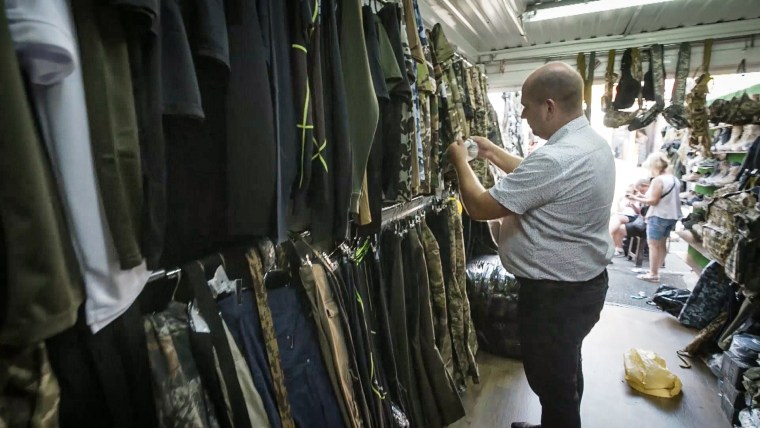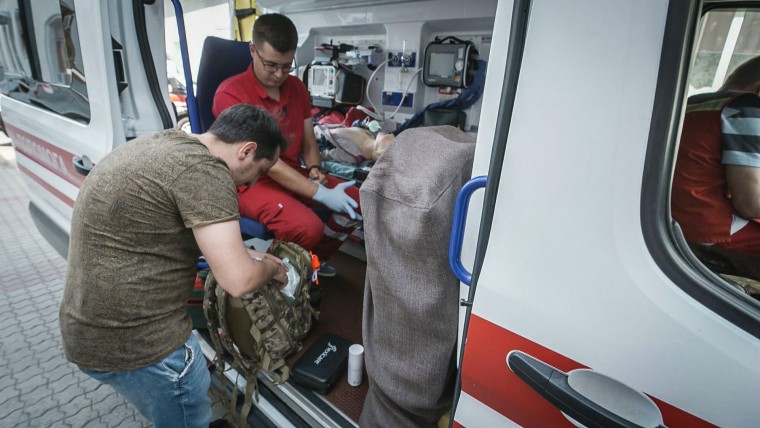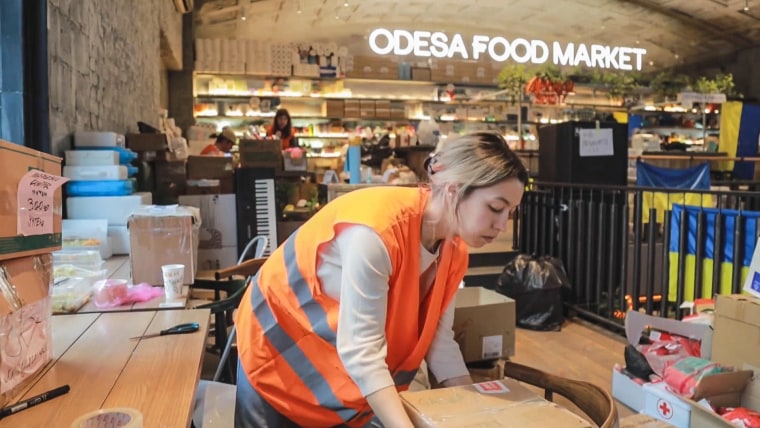ODESA, Ukraine — At a sprawling open-air market near the Black Sea, shoppers duck in and out of rusting shipping containers that have been converted to makeshift army surplus shops, scanning row upon row of uniforms, boots and tactical gear.
Some are Ukrainian soldiers stocking up on supplies for the battlefield. Others, like former taxi driver Dmytro Kazmirchuk, are volunteers taking it upon themselves to outfit front-line troops who still lack the basics.
“Ukraine wasn’t ready for this war. We never thought that our neighbor, who turned out to be our enemy, would resort to a full-scale invasion,” Kazmirchuk says as he picks out goggles, gloves and camouflage T-shirts for six service members he’s sponsoring in Donetsk. “Therefore, not everyone has everything.”

Ukraine’s loudest pleas to its allies have been for fighter jets, air defense systems and long-range weapons to defend itself. The United States and its allies have answered many of those calls by providing billions of dollars worth of rockets, tanks, drones and artillery.
Yet, as Russia’s war approaches the six-month mark, Ukraine is also burning through its stores of necessities that most modern militaries take for granted. Now, President Volodymyr Zelenskyy, Ukrainian troops and their supporters are seeking out creative solutions to crowdsource their way through the war.
Mykhailo Podolyak, a top adviser to Zelenskyy, told NBC News that Ukraine’s military needs continual resupplies from allies of food, first-aid kits, vehicles, protective equipment, small arms and ammunition. At the height of Russia’s offensive, he said, it was firing up to 60,000 rounds of ammunition per day, forcing Ukraine to respond in turn.
“The societies in certain partner countries do not fully understand the level of intensity of the war in Ukraine,” he said in an interview at the presidential offices in Kyiv. “This is a massive war; it is not just a minor regional conflict.”
Part of the challenge in keeping Ukraine’s forces supplied is the growing number of people participating in the fight.

In the run-up to the war, Ukraine’s armed forces comprised just under 200,000 active-duty troops, according to a report from the International Institute for Strategic Studies, a London-based security think tank. Russia had more than four times that number, it said.
Just hours after Russia invaded Feb. 24, Zelenskyy signed a decree ordering a “general mobilization” of the public, recently extended by Ukraine’s Parliament until November. Since then, hundreds of thousands of reservists, members of Ukraine’s Territorial Defense Forces and others have joined the battle.
“There’s also police, and National Guard are also (serving) in the front,” said Yevheniya Kravchuk, a member of Parliament whose husband is in the national police force. “They basically have needs the same as our military.”
In May, Zelenskyy said Ukraine’s armed forces had grown to 700,000-strong. That same month, he launched a national crowdfunding drive, United24, to bring in donations of cash, medical equipment and defense supplies, audited by Deloitte Ukraine.

Through an online portal, donors are asked to sponsor specific items that, once purchased, are rushed to the front lines: $4,000 for a metal detector to aid in clearing land mines; $80,000 for an armored ambulance.
The project is also trying to acquire an “army of drones” to help Ukraine’s military monitor the 1,200-mile-long front line. The campaign includes a drop-off site just outside New York City where donors can drop off their own hobby drones to be sent to Ukraine.
With emergency medical supplies also in growing need, the project recently said it purchased 35 artificial ventilation devices, to be used by paramedics and doctors who work 24-hour shifts evacuating troops and civilians injured near the front lines.
As he practiced intubating a medical dummy in his ambulance at an Odesa hospital, Dr. Eduardo Kika said the devices have helped save lives of patients injured in mine explosions, and those with lung failure or with traumatic brain injuries who can’t breathe for themselves.
“Unfortunately, we do not have enough devices. We have a shortage of ventilators,” the emergency physician and anesthesiologist said through a translator. He said tourniquets, bandages and hemostatic sponges to control bleeding are also in short supply. “As for the front line, our soldiers need painkillers.”
Some Ukrainians who have joined the fight are turning to family, friends and co-workers to help make up for shortages.
On the main drag in the bustling capital, Kyiv, the tables at the Georgia restaurant overflow with khachapuri (Georgian cheese bread), khinkali dumplings and traditional Georgian wine. But the proprietor, Chef Alexander, is nowhere in sight.
He is serving on the front lines and the restaurant declined to provide his last name to protect his safety on the battlefield.
Alexander was deployed without much of the basic equipment he needed, the restaurant’s manager, Olga Rogozina, said. The restaurant now devotes 10 percent of every bill to buying him gear: First, night-vision goggles, and next, a Volkswagen to transport him and six of his troop mates.
“All the Ukrainian people are helping our army,” Rogozina said. “And if they are looking for a way to help, they have this way.”
